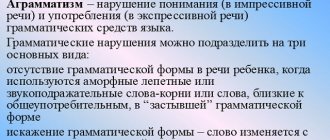Advice on choosing tongue twisters for people who stutter
Every person who stutters has a rather poorly developed speech apparatus, and some of the muscles are not active enough. With the help of articulatory gymnastics, you develop them to normal. Moreover, each person who stutters has his own special letters or letter combinations that are especially difficult for him to pronounce. If you don’t know which sounds cause you difficulty, then record your speech. By listening to the audio recording, you can determine your sound problem. It is necessary to select tongue twisters with these sounds.
Extremely important!!! Inhale through the nose ⏫ - we make sounds as we exhale, using the flow of air. We've run out of air, take a break ⏸️ - breathe in again ⏫.
- ⏫ Stop - don’t stagger, walk - don’t stumble, speak - don’t stutter ⏸️, ⏫ lie - don’t lie.⏸️
- ⏫ The clatter of hooves sends dust flying across the field.⏸️
- ⏫Toma cried all day on a bench near the house.⏸️
- ⏫ How thirty-three Egorkas lived on a hillside ⏸️: ⏫ one Egorka, two Egorkas, three Egorkas...⏸️
Article:
A cheerful set of words, rhymes, and phrases can be easily pronounced with clear, unmistakable pronunciation. In addition, tongue twisters for the development of diction, in addition to entertainment, will help you learn to pronounce sounds and words clearly, acquire correct diction and get rid of speech defects. Practicing sounds: b, p, v, f, g, k, d, t, x - From the clatter of hooves, dust flies across the field. - The bull is blunt-lipped, the bull is blunt-lipped, the bull’s white lip was dull. - A cap on a cap, a cap under a cap. — The big man Vavila merrily moved his pitchfork. — There are bells near the stake, there is a whirlpool near the gate. - The jackal walked, the jackal galloped. - Buy a pile of spades, buy a pile of spades. Buy a pile of fluff, buy a pile of fluff. — Cook Peter, cook Pavel. Peter swam, Pavel swam. — A weaver weaves fabrics for Tanya’s scarves. — The water truck was carrying water from the water supply. — It’s worth a heap with a little under the head. — Frosya is flying millet into the field, Frosya is taking out the weeds. — The crab made a rake for the crab. The crab gave the rake to the crab: rake the hay, crab, rake! — The Christmas tree has pins and needles. — Cuckoo bought a hood. Put on the cuckoo's hood. How funny he is in the hood! - All beavers are kind to their own. Beavers take beans for beavers. Beavers sometimes excite beavers by giving them beans. - Pankrat Kondratov forgot the jack, and Pankrat cannot lift the tractor on the road without a jack. And a tractor jack is waiting on the road. - There’s a honey cake for honey, but I’m not in the mood for a honey cake. - Prokop came, dill was boiling, Prokop left, dill was boiling; Just as under Prokop the dill was boiling, so without Prokop the dill was boiling. — Feofan Mitrofanych has three sons, Feofanych. — Our guest took away our cane. “The black grouse was sitting on a tree, and the black grouse with the grouse were on a branch.” - I praise the halva. - The crested little girls laughed with laughter. Practicing the sounds: r, l, m, n - Two woodcutters, two woodcutters, two woodcutters were talking about Larka, about Varka. — Clara the Queen crept towards the chest. - There is grass in the yard, there is firewood on the grass - one firewood, two firewood, three firewood. Don't cut wood on the grass in your yard. “There’s firewood in the yard, there’s firewood behind the yard, there’s firewood across the width of the yard, the yard won’t accommodate the firewood, the firewood needs to be moved to the woodyard.” — In the yard of the widow Varvara, two thieves were stealing firewood, the widow got angry and put the wood in the shed. “The fellow ate thirty-three pie pies, all with cottage cheese.” - Thirty-three ships tacked, tacked, but didn’t tack. — In the shallows we lazily caught burbot. In the shallows we lazily caught tench. Was it not you who sweetly begged me for love and beckoned me into the mists of the estuary? — Karl stole corals from Clara, and Clara stole a clarinet from Karl. — Queen Clara severely punished Charles for stealing the coral. — Karl put the bow on the chest. Clara was stealing onions from the chest. — Romasha’s mother gave her some whey from her yogurt. - Tell me about your purchases. What about purchases? About shopping, about shopping, about your purchases. - Eagle King. - Malanya the chatterbox chatted and blurted out the milk, but didn’t blurt it out. —Have you watered the lily? Have you seen Lydia? They watered the lily and saw Lydia. - Our Polkan from Baikal lapped. Polkan lapped, but did not shallow Baikal. - We ate, ate ruffs from the spruce tree, we barely finished them off from the spruce tree. “Mom didn’t spare soap.” Mom washed Mila with soap. Mila didn't like soap, Mila dropped the soap. — Tractors have been rattling on the road since the morning. - An eagle on a mountain, a feather on an eagle, a mountain under an eagle, an eagle under a feather. — On Mount Ararat, Varvara was picking grapes. Practicing the sounds: z, s, zh, sh, ch, shch, c - Senya and Sanya have catfish with mustaches in their nets. - The wasp does not have whiskers, not whiskers, but antennae. — Senka is carrying Sanka and Sonya on a sled. Sledge jump, Senka's feet, Sanka's side, Sonya's forehead, all in a snowdrift. - Osip is hoarse, and Arkhip is hoarse. - He doesn’t want to mow with a scythe, he says, scythe is a scythe. — The net caught on a twig. — Seven of us sat in the sleigh ourselves. — Watermelons were being reloaded from truck to truck. During a thunderstorm, the body fell apart in the mud from a load of watermelons. — The waxwing is blowing a pipe. — Sasha walked along the highway and sucked on a dryer. - The heron wasted away, the heron was dry, the heron was dead. - Forty mice walked, they found forty pennies, two poorer mice found two pennies each. - Sixteen mice walked and six found pennies, and the mice, which are worse, noisily fumble for pennies. — Scales on a pike, bristles on a pig. “It’s terrible for a beetle to live on a bitch.” — Two puppies are nipping cheek to cheek at a brush in the corner. - The pike tries in vain to pinch the bream. — The ground beetle is buzzing, buzzing, but not spinning.
Tongue twisters in “ZhZ”
- ⏫ In the iron deposits there is a jelly rod.
- ⏫ The splinter dug into the wasp’s sting, causing it to squeal.
- ⏫ Two rivers: Vazuza with Gzhat, Vazuza with Gzhat.
Do not forget! The main thing is not speed, but the absence of stuttering and clarity of pronunciation!
Speak slowly at first, speeding up the pace each time, but only if you manage to pronounce the tongue twister correctly.
What methods of logorhythmics exist?
Music, movement and speech are very closely related. Corrective logorhythmic techniques are based on this connection.
The course of treatment includes the following types of classes:
- musical motor games;
- communication games;
- singing;
- recitation of poems and tongue twisters;
- melodic declamation.
Rhythmic movements to music develop motor skills, which are always closely related to expressive speech . Impaired motor skills, inhibition or increased excitability, cause muscle spasms while pronouncing words. Improving motor skills allows you to achieve rhythmic, smooth speech and control its tempo.
The use of a metronome during correctional speech therapy work facilitates the development of speech rhythms when stuttering.
The tempo of the metronome is set depending on the individual characteristics of the stutterer. For each beat, one syllable must be pronounced, punctuation marks are highlighted by silence for 2 beats.
Goals and benefits for people who stutter
The main goal of using logorhythmics is to achieve a lasting improvement in speech rhythms and the correct sound of words and fluency of speech.
The benefits of logorhythmic exercises are undeniable ; in addition to speech development and getting rid of speech disorders, they improve mental state. Success during classes allows you to cope with the fear of communication due to stuttering.
Pros and cons of treating adults, children and adolescents
Logorithmic methods have the following advantages:
- breathing correction;
- setting the rhythm of speech;
- development of fluency of pronunciation;
- elimination of muscle spasm;
- getting rid of forced pauses in speech and repetitions of sounds.
Flaws:
- Regular training is required;
- It takes several months to achieve results.
Logorhythmic methods for correcting stuttering are varied, but they have one goal - to get rid of speech disorders . Regardless of the chosen methodology, it is important to remember that the main thing in achieving success is consistency and regularity of classes.
Poetry
Reciting poetry develops a sense of rhythm, makes speech more expressive, and strengthens memory . In addition, the poems of the classics improve aesthetic development and enrich vocabulary. When choosing poems, they usually focus on the age of the stutterer.
Young children are offered simple poems, such as nursery rhymes. Children enjoy participating in mini-performances based on the plot of the poem they have learned.
Preschoolers and schoolchildren are offered poems written at different tempos for recitation . More melodic and smooth ones are suitable for starting training. In the future, you can use more complex poetic forms.
It is advisable to invite the child to choose his favorite poem from several proposed ones. Positive emotions will make it easier to memorize and make recitation more enjoyable.
Games as a means of problem correction for preschoolers
Correction and elimination of stuttering in preschool children occurs faster if classes are conducted in a playful way, in play situations. During group lessons, the child also learns the techniques of speaking in a group.
Silent women
The purpose of such games is to relax the child, give a break between intense classes , an opportunity to consolidate a new speech skill, and teach how to quickly switch while working.
In addition, some games are aimed at identifying the source of sound, following commands, and improving articulation.
Scuba diver
The child is told that if you talk underwater, you can choke. You can use suitable surroundings, for example, look at pictures with fish and shells. The silence should last at least several minutes .
Key
The baby makes a movement simulating closing his mouth with a key. After this he should not speak. Children like it if at this time an adult provokes them to talk by asking questions. This exercise helps reduce stress from difficult activities .
Show me where the sound is
Children listen to sounds with their eyes closed. The adult steps aside and claps his hands. The child must silently show where the sound came from.
To improve auditory attention
The purpose of these games is to teach the child attentiveness , develop memory, and improve associative perception.
Who's flying
The child must clap if the correct words are named; if a flightless animal is named, the children must remain silent.
Begin the exercise by slowly pronouncing the sentences. As the lesson progresses, pronunciation speeds up.
Correct the mistake
An adult reads poems that include words and concepts familiar to the child. While reading, mistakes are made that distort the meaning of what is read. The child must correct the incorrectly pronounced word.
Can't be repeated
The child is told that an adult cannot repeat words. If he hears the same ones, he must clap his hands. An adult says several words, repeating one of them.
For the development of breathing
The main goal of these exercises is to rid the child of short inhalations and exhalations , which significantly impede fluency of speech. During the game, the child learns to breathe correctly, control inhalation and exhalation, and gets rid of obsessive movements.
Score a goal
The child, blowing strongly, must send a light object (a ball of cotton wool, a balloon) to a certain place.
Help the butterfly
A child blows on paper butterflies suspended on a thread. It is advisable to direct the air stream upward as much as possible.
Fly, birdie!
Paper bird figures need to be blown away as far as possible, using only one exhalation.
Intensive inhalation and exhalation can lead to dizziness. Between exercises you need to pause for 2 - 3 minutes.
Video showing how you can simultaneously practice the correct pronunciation of sound and the formation of control over speech breathing:
For relaxation
Allows you to relax muscles, relieve spasms and psycho-emotional tension . For overly excitable children, it is difficult to concentrate on performing speech therapy exercises for a long time; such games help facilitate switching of attention and relaxation between exercises.
Ice cream
The child imagines himself as ice cream, hard and cold. At the beginning of the exercise, he should tense his muscles strongly. Gradually the ice cream melts, the child slowly relaxes.
Hot and cold
The adult tells how hot it is, the child spreads his arms to the sides and straightens up to his full height. A cold wind blew - the child squatted, wrapping his arms around himself.
Kind angry
The child imagines himself to be very angry, clenching his jaw and clenching his fists. After this, he becomes kind - relaxes and smiles.









